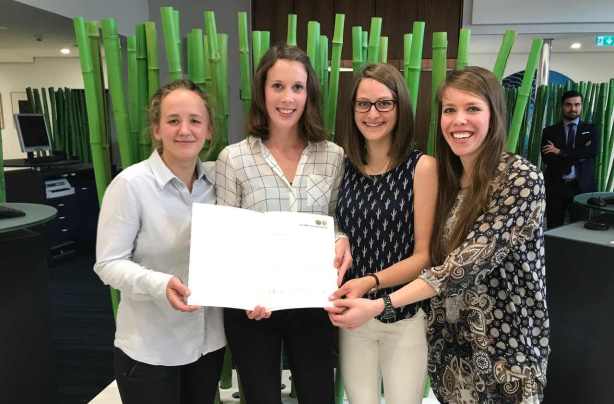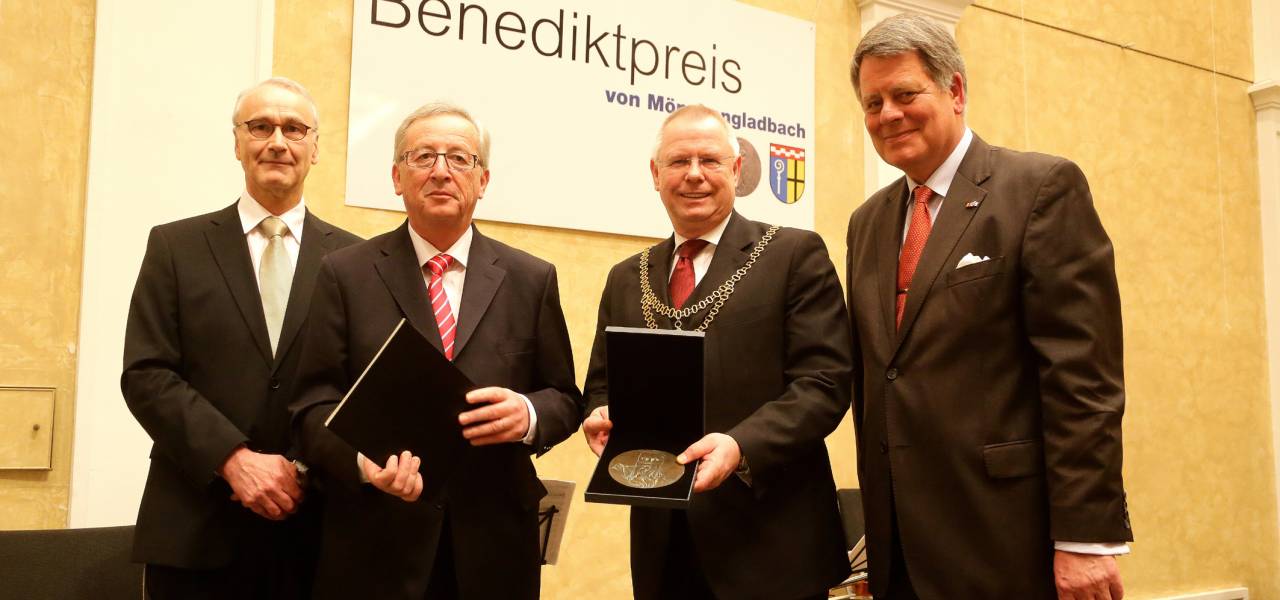ABOUT THE BENEDICT PRIZE
The objective
The Benedict Prize of Moenchengladbach is awarded for value-oriented and, against the background of the Christian occidental experience, in a special way outstanding action.
The prize is awarded for fundamental contributions, especially in the fields of science, economics, politics, society and culture, which are exemplary for the future.
The prize comes with a certificate, plaque and prize money of 5,000 euros. The association “Benediktpreis von Mönchengladbach” awards this prize in cooperation with the city of Mönchengladbach and with the support of Gladbacher Bank.
History of origins
Since 1968, the “Benediktspreis” (Benedict Prize) has been awarded in Moenchengladbach by the “Bürger- und Heimatverein” (Citizens’ and Local History Association) in cooperation with the city of Moenchengladbach to personalities who have made outstanding contributions in the fields of research, art and science and who have rendered outstanding services to the preservation of local history and customs. Due to the dissolution of the citizens’ association, this prize was awarded for the last time in 2010. Its continuation was not assured.
Moenchengladbach citizens did not want to resign themselves to this situation and in 2012 started thinking about a new beginning, which led to the founding of the association “Benediktpreis von Mönchengladbach e. V.” in June 2013. In doing so, they acted in the conviction that a great opportunity is always perceived with the sign-setting award of a prize that bears the name of Benedict of Nursia and is associated with his thinking: By honouring outstanding personalities and their respective exemplary achievements, the effectiveness of responsible, value-based action can be made public again and again. This would counteract the trend towards non-acceptance of binding values and even arbitrariness by highlighting the importance of fundamental and historically grown values for our coexistence.
Thus, the idea of using the “ora et labora” rule, which has been in force since the founding of the Benedictine Order, as the basis for the award of the renewed Benedict Prize, arose from a consideration of the attempt to reconcile faith and reason, which has been successful up to the present day. Against the background of tradition and present-day effectiveness, future awards are to be given to personalities whose value-oriented actions against the backdrop of the Christian occidental experience in
Christian occidental experience in a special way. This is expressed above all in fundamental works and/or deeds – also by younger people – in science, economics, politics, society and culture, which are exemplary for the future.
The prize is independent of religious confession and political party affiliation.
The respective prize winner is determined by a board of trustees to be elected by the association “Benediktpreis von Mönchengladbach”. The board of trustees should, as far as possible, reflect the entire spectrum from which the prize winners can come according to the statutes.
The biennial award ceremony is to take place around 21 March (Benedict’s Day), for the first time on 21 March 2014.
A city in the Benedictine tradition
Signposts sometimes show the way, even though they are wrong. The name of our city then appears shortened: M’gladbach. Yet it is precisely the shortened part that is important, because it points to the history: Moenchengladbach!
For almost a millennium, the Benedictine monks of St. Vitus Abbey determined the fate of Moenchengladbach. Anyone walking through our town will find a stone here and there decorated with the crook of an abbot’s staff. Such boundary stones were used to mark the sphere of influence of the Gladbach monastery. Up to this point, the abbot had his say. There was more at stake here than spiritual rule; tangible economic interests were involved. Many farms belonged to the abbey and were managed on its behalf and for its profit. With their economic operations, the monks determined life in the small town. Its inhabitants depended on the abbot’s art of governing. Although life was good under the crook, as the saying goes, the abbot’s power was still great. He was reluctant to share it with the Duke of Juelich. The subjects had to swear obedience to both.
In 974, Benedictine monks with their abbot Sandrad had moved to the Gladbach to found a monastery there on behalf of the Ottonian imperial house. Political considerations were behind this. The emperor’s power had to be secured in the west. Benedictines were particularly well suited for this, as they had skilfully linked spirituality, politics and culture since their foundation. The Rule of St. Benedict is considered the foundation of Christian culture in Europe. “Pray and work” are the keywords that entered into an unmistakable symbiosis. What is usually forgotten is the Rule’s call to read the holy scriptures. Those who prayed had to work. But those who worked also had to read. For this reason, Gladbach Abbey housed a valuable library and a Latin school, which at least provided an opportunity for education. After the abbey was dissolved under Napoleon in 1802, the Minster Church, the abbot’s prelature, the shrine and an outstanding treasure of relics remained testimonies to the Benedictine past. In former times, the chain of office of the Lord Mayor of Mönchengladbach rightly described the development of the city in four letters: A.M.A.I.: A Monachis Ad Industriam. Or from the monks to industry, the history of the city of Mönchengladbach can hardly be summed up more succinctly.




